China Evergrande Group Bundle
Can Evergrande's Core Principles Illuminate Its Path Forward?
Delving into the heart of China Evergrande Group, understanding its mission, vision, and core values is crucial, especially given its recent challenges. These foundational elements offer insights into the company's strategic direction and how it aims to redefine its future. Examining these principles provides a unique lens through which to analyze the China Evergrande Group SWOT Analysis and its potential trajectory.
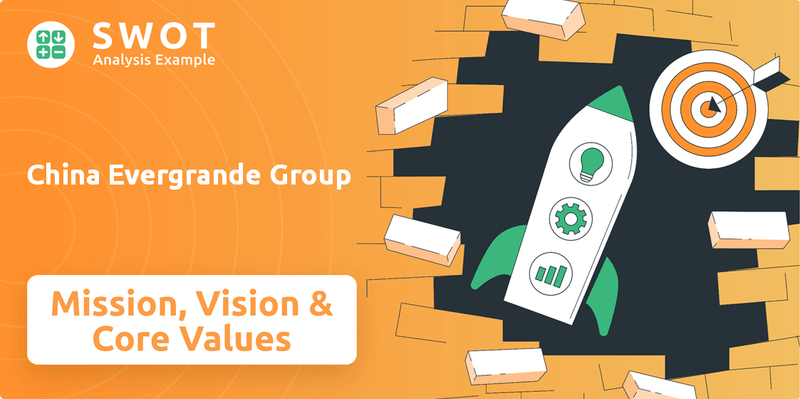
The Evergrande company's mission statement, vision, and core values are more than just corporate jargon; they represent the company's aspirations and guiding principles. Exploring the Evergrande group mission statement analysis and its vision for the future helps us understand its approach to the real estate market. Furthermore, examining Evergrande's core values and business practices can reveal how it intends to navigate its current situation and achieve its strategic goals and objectives.
Key Takeaways
- Evergrande's initial focus was on rapid expansion, quality, and integrity.
- The company's liquidation highlights the need for practical implementation of values.
- Financial prudence and accountability are crucial for corporate sustainability.
- Evergrande's situation underscores the importance of stakeholder commitment.
- Sustainable practices are essential for long-term success in real estate.
Mission: What is China Evergrande Group Mission Statement?
Evergrande's mission is 'building the brand with quality and establishing the enterprise with integrity.'
The Evergrande mission statement, "building the brand with quality and establishing the enterprise with integrity," encapsulates the core principles guiding the China Evergrande Group. This mission statement provides a foundational understanding of the company's objectives and approach to business. It's a crucial element in analyzing the Evergrande company's strategic direction and its impact on stakeholders.
The emphasis on "quality" highlights Evergrande's commitment to delivering superior properties. This involves using high-quality materials and construction practices. This focus aims to attract customers seeking reliable and desirable homes.
The phrase "establishing the enterprise with integrity" underscores the importance of ethical business practices. This includes transparent dealings and responsible financial management. Integrity is crucial for building long-term trust with investors, customers, and partners.
The Evergrande mission primarily targets the real estate market. The company's core business revolves around property development and construction. This focus is reflected in its large-scale residential projects across China.
While not explicitly customer-centric, the mission's emphasis on quality indirectly caters to customer needs. By prioritizing quality and integrity, Evergrande aims to meet customer expectations. This approach is critical for brand reputation and customer loyalty.
The mission statement has both internal and external implications. Internally, it guides the company's operations and values. Externally, it shapes how the company is perceived by the public and stakeholders. This dual impact is essential to understanding the Evergrande's strategic goals and objectives.
The mission statement significantly impacts stakeholders, including customers, investors, and employees. For customers, it promises quality properties. For investors, it suggests ethical practices. For employees, it sets a standard for conduct. To learn more about Evergrande's business strategies, consider reading about the Growth Strategy of China Evergrande Group.
Analyzing the Evergrande group mission statement analysis reveals a commitment to quality and integrity as the cornerstones of its brand. This mission statement provides a framework for understanding Evergrande's vision in the real estate market and its approach to business. Understanding these elements is crucial for assessing the company's long-term prospects and its impact on the broader market. Furthermore, the Evergrande core values and business practices are deeply rooted in this mission statement, influencing the company's operational decisions.
China Evergrande Group SWOT Analysis
- Complete SWOT Breakdown
- Fully Customizable
- Editable in Excel & Word
- Professional Formatting
- Investor-Ready Format
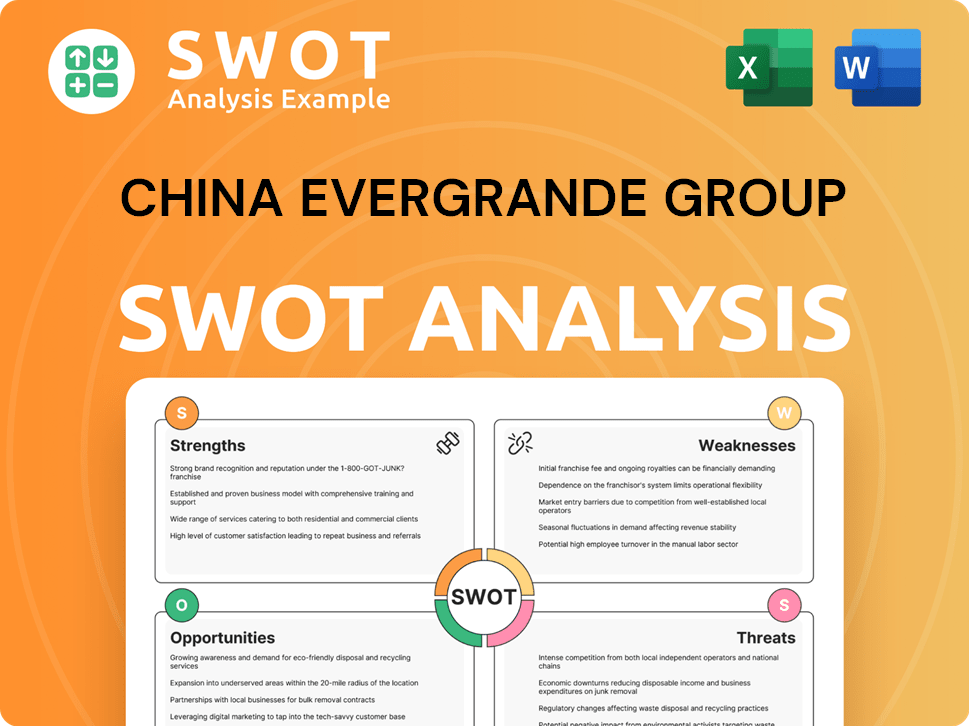
Vision: What is China Evergrande Group Vision Statement?
China Evergrande Group's vision, in its heyday, appeared to be "to become a global leader in diversified industries, driving innovation and creating sustainable value."
Delving into the Evergrande vision requires acknowledging the company's tumultuous recent history. While a formal, updated vision statement for 2024-2025 is unavailable due to the ongoing restructuring and liquidation proceedings, understanding the historical context is crucial. The Evergrande company once harbored ambitious goals, aiming for significant expansion and diversification beyond its core real estate business. This included forays into electric vehicles, healthcare, and finance, signaling a desire to become a multifaceted conglomerate.
Before its financial troubles, China Evergrande Group envisioned itself as a dominant force across multiple sectors. This ambitious vision was fueled by rapid expansion and a willingness to invest heavily in new ventures. The company aimed to disrupt existing markets and establish itself as a leader in various industries.
Evergrande's Evergrande strategy included a significant push into non-real estate sectors. This diversification was intended to reduce reliance on the volatile property market and create new revenue streams. The company's investments in electric vehicles, for example, were a key part of this strategy.
The overarching goal was to achieve market leadership in the sectors Evergrande entered. This ambition drove aggressive expansion and a focus on rapid growth. The company aimed to be a pioneer in its chosen fields, setting new standards and capturing significant market share.
The current situation, however, presents a stark contrast to these aspirations. With liquidation proceedings underway and significant debt restructuring efforts, the Evergrande mission and vision are undergoing a drastic re-evaluation. The focus has shifted from expansion to survival and debt resolution.
The revised vision, if any, will likely prioritize the interests of creditors and stakeholders. This means a focus on asset sales, debt repayment, and potentially a scaled-down version of the original vision. The impact on employees, investors, and the broader economy is substantial.
The future of Evergrande is uncertain, but any new vision will need to be grounded in the realities of its current financial position. The company's ability to achieve even a fraction of its past goals hinges on successful restructuring and a return to financial stability. You can learn more about the competitive landscape in the Competitors Landscape of China Evergrande Group.
The shift in Evergrande's core values and strategic direction is a direct consequence of its financial difficulties. The company's once-aggressive expansion strategy, fueled by significant borrowing, proved unsustainable. The Evergrande group mission statement analysis reveals a disconnect between the initial vision and the current reality. The company's debt, estimated at over $300 billion at its peak, has forced a reassessment of its long-term goals. The original vision, which aimed for broad industry disruption and market leadership, has been significantly curtailed. The focus now is on navigating the complex restructuring process and mitigating the impact on stakeholders. The Evergrande's vision in real estate market is also significantly impacted, with the focus shifting from expansion to completion of existing projects and debt reduction.
China Evergrande Group PESTLE Analysis
- Covers All 6 PESTLE Categories
- No Research Needed – Save Hours of Work
- Built by Experts, Trusted by Consultants
- Instant Download, Ready to Use
- 100% Editable, Fully Customizable
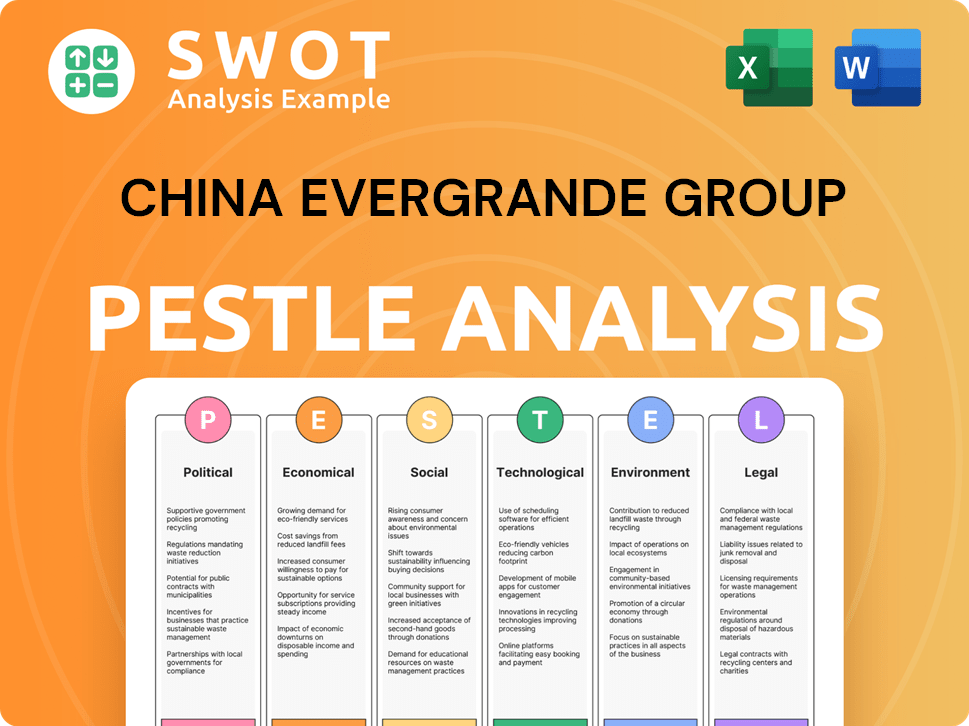
Values: What is China Evergrande Group Core Values Statement?
Understanding the core values of China Evergrande Group, or Evergrande, provides critical insight into its operational philosophy. These values, as historically articulated, shaped the company's approach to business and its interactions with stakeholders.
Evergrande emphasized "hard work" as a foundational value, promoting dedication and perseverance within its workforce. This value was intended to drive ambitious project timelines and aggressive expansion strategies, contributing to the company's rapid growth in the real estate market. This focus on hard work was meant to translate into tangible results, such as the completion of numerous large-scale residential and commercial projects across China.
The value of "unselfish contribution" highlighted the importance of teamwork and a collaborative spirit within Evergrande. This value aimed to foster a culture where employees prioritize collective goals and support each other's efforts. This was intended to create a cohesive environment where employees are motivated to work towards common objectives, such as delivering high-quality projects and achieving financial targets.
Evergrande’s emphasis on "diligent fighting" underscored its commitment to overcoming challenges and persevering through difficulties. This value encouraged employees to be resilient and persistent in the face of adversity, which was particularly important in the complex and competitive real estate market. This value was intended to drive the company to push through obstacles and maintain its ambitious growth trajectory, even amidst economic fluctuations or project setbacks.
The value of "aggressive exploration" promoted a proactive approach to seeking new opportunities and innovation. This value encouraged the company to venture into new markets, develop innovative products, and continuously improve its business practices. This was intended to position Evergrande as a leader in the real estate sector, capable of adapting to changing market dynamics and capitalizing on emerging trends. For example, Evergrande explored ventures into electric vehicles and other diverse sectors.
These core values, while aspirational, provide a framework for understanding Evergrande's operational approach and its intended corporate culture. The actual impact of these values on the company's performance and its stakeholders is a complex issue, as highlighted in an analysis of the Marketing Strategy of China Evergrande Group. Now, let's explore how these values, alongside the Evergrande mission and vision, influenced the company's strategic decisions.
How Mission & Vision Influence China Evergrande Group Business?
The Evergrande mission and Evergrande vision served as the guiding principles for the company's strategic decisions, influencing its expansion and diversification efforts. These statements provided the framework for the company's objectives and operational approaches.
Historically, the Evergrande mission and Evergrande vision fueled the company's ambitious growth strategy. This expansionist approach led to diversification into sectors beyond real estate, such as electric vehicles and property management. This strategy was intended to achieve market dominance and increase shareholder value.
- Aggressive expansion into various sectors.
- High debt levels to support rapid growth.
- Focus on increasing total assets and annual sales volume.
- Entering into new business ventures.
The Evergrande strategy was heavily influenced by its mission and vision, which aimed at achieving specific strategic goals. These included becoming a leading real estate developer and expanding into related industries. These objectives were supported by significant investments and acquisitions.
The Evergrande core values were expected to guide day-to-day operations, particularly in areas like construction quality and project execution. This was intended to ensure that all projects aligned with the company's broader strategic goals. However, the company's current state suggests a significant disconnect.
While direct links are difficult to ascertain currently, past performance metrics such as total assets and annual sales volume were, in theory, reflections of the company's mission and vision. These metrics were used to assess the success of their expansionist goals. The company's financial distress indicates a failure to meet these objectives.
The current state of liquidation for China Evergrande Group highlights a significant disconnect between the stated principles and the actual outcomes of its strategic decisions. This situation underscores the importance of aligning mission, vision, and core values with effective business practices. The company's downfall serves as a cautionary tale.
The Evergrande's mission vision and values impact on stakeholders is evident in the current situation. Investors, creditors, and customers have all been affected by the company's financial difficulties. This highlights the importance of transparency and accountability in corporate governance.
Evergrande's corporate social responsibility initiatives, if any, and their effectiveness are now under scrutiny. The company's financial struggles raise questions about its commitment to sustainable development and ethical business practices. The impact on the broader economy is also significant.
The influence of the Evergrande mission, Evergrande vision, and Evergrande core values on strategic decisions is evident in the company's history of expansion and diversification. However, the current situation reveals a need for a reassessment of these principles and their alignment with business practices. To learn more about these principles, you can read the comprehensive analysis in Mission, Vision & Core Values of China Evergrande Group. Let's explore the core improvements to the company's mission and vision in the next chapter.
China Evergrande Group Business Model Canvas
- Complete 9-Block Business Model Canvas
- Effortlessly Communicate Your Business Strategy
- Investor-Ready BMC Format
- 100% Editable and Customizable
- Clear and Structured Layout
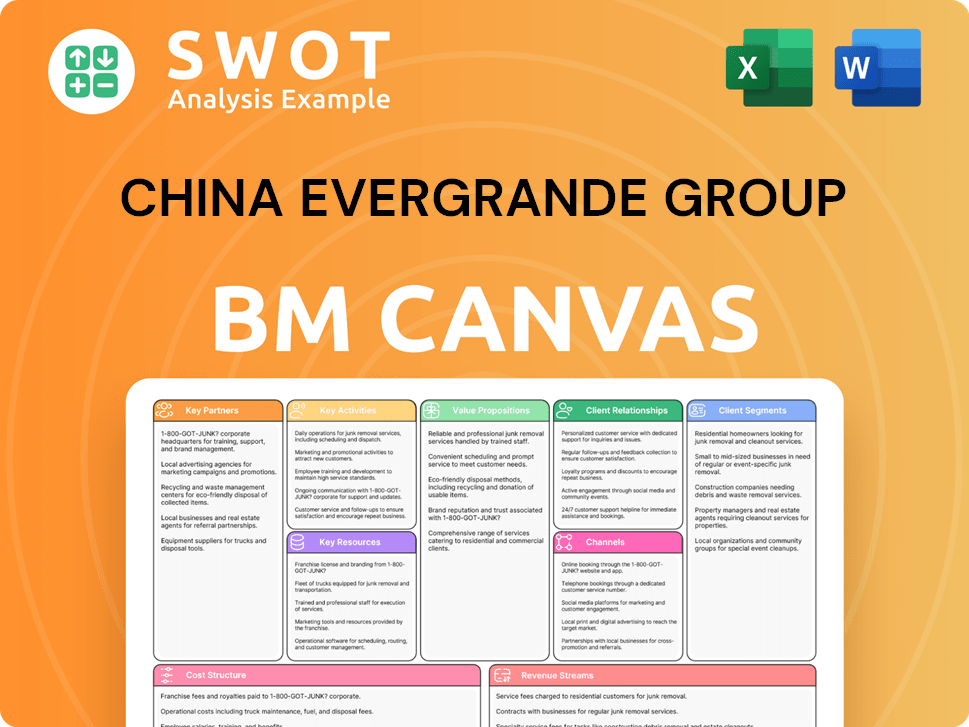
What Are Mission & Vision Improvements?
Considering China Evergrande Group's current situation, significant improvements are needed to its mission and vision statements. These adjustments should reflect a shift towards financial stability, stakeholder trust, and responsible business practices.
A revised mission for China Evergrande Group should explicitly integrate a commitment to financial prudence and sustainable growth. This means moving away from aggressive expansion and prioritizing responsible financial management, including debt reduction and improved cash flow. This shift is crucial, considering Evergrande's liabilities, which were estimated at over $300 billion in 2023, highlighting the need for a more cautious approach going forward.
The Evergrande mission must emphasize transparency and accountability to all stakeholders, including creditors, homebuyers, and investors. This includes providing clear and consistent financial reporting, as well as establishing mechanisms for addressing complaints and concerns. Enhanced transparency is critical, especially after the company's debt crisis, which led to significant losses for investors and a decline in public trust. The company's failure to meet its debt obligations, as reported in various financial news outlets, underscores the need for improved governance.
The Evergrande vision needs to shift its focus from ambitious expansion to rebuilding trust and delivering on existing commitments. This includes completing projects, honoring contracts, and restoring confidence among stakeholders. This change is vital, given the significant number of unfinished projects and the impact on homebuyers, as highlighted in reports from real estate industry analysts. The company's ability to deliver on its promises will be key to its future, as discussed in Brief History of China Evergrande Group.
The Evergrande strategy must adapt to the evolving market realities and regulatory landscape. This includes complying with stricter financial regulations and adjusting to the changing demands of the real estate market. This is particularly important, given the government's increased scrutiny of the real estate sector and the need for sustainable business practices. This adaptation is crucial for long-term viability, as the company navigates the complex environment of the Chinese real estate market.
How Does China Evergrande Group Implement Corporate Strategy?
The implementation of a company's mission, vision, and core values is crucial for translating strategic intent into tangible outcomes. This section examines how China Evergrande Group attempted to implement its stated principles and the consequences of those efforts.
Historically, Evergrande's implementation strategy revolved around aggressive expansion and diversification. The company channeled resources into new real estate projects, venturing into sectors like electric vehicles and theme parks. Leadership, particularly the founder, played a central role in driving this growth, aiming to instill the stated values of hard work and efficiency within the organization.
- Rapid expansion into new markets and industries.
- Emphasis on ambitious project launches and development.
- Leadership-driven culture focused on achieving rapid growth targets.
- Communication of the Evergrande mission, Evergrande vision, and Evergrande core values through internal and external channels.
Evergrande communicated its Evergrande mission and Evergrande vision through various channels. This included corporate messaging, internal training programs, and public relations efforts. The goal was to create a unified brand identity and foster a sense of purpose among employees and stakeholders. However, the effectiveness of this communication in aligning actions with stated values is now highly questionable.
The current situation reveals a significant disconnect between Evergrande's stated values and its actual business practices. The financial crisis, marked by the inability to repay debts and the subsequent liquidation order, exposed fundamental flaws in the implementation of principles like integrity and meticulous planning. The company's debt reached a staggering $300 billion at its peak, illustrating a severe failure in financial management.
Formal programs or systems designed to ensure alignment with the Evergrande mission and Evergrande vision appear to have been inadequate. The lack of effective risk management, transparent financial reporting, and robust internal controls contributed to the crisis. This suggests that the company's implementation strategies failed to translate espoused values into operational realities.
The implementation failures have had significant consequences for stakeholders. Investors have suffered substantial losses, and creditors face uncertainty regarding debt recovery. Employees have experienced job insecurity, and the broader economy has been impacted by the company's financial distress. The lack of alignment between stated values and actions eroded stakeholder trust. Learn more about the company's financial structure in our analysis of Revenue Streams & Business Model of China Evergrande Group.
China Evergrande Group Porter's Five Forces Analysis
- Covers All 5 Competitive Forces in Detail
- Structured for Consultants, Students, and Founders
- 100% Editable in Microsoft Word & Excel
- Instant Digital Download – Use Immediately
- Compatible with Mac & PC – Fully Unlocked
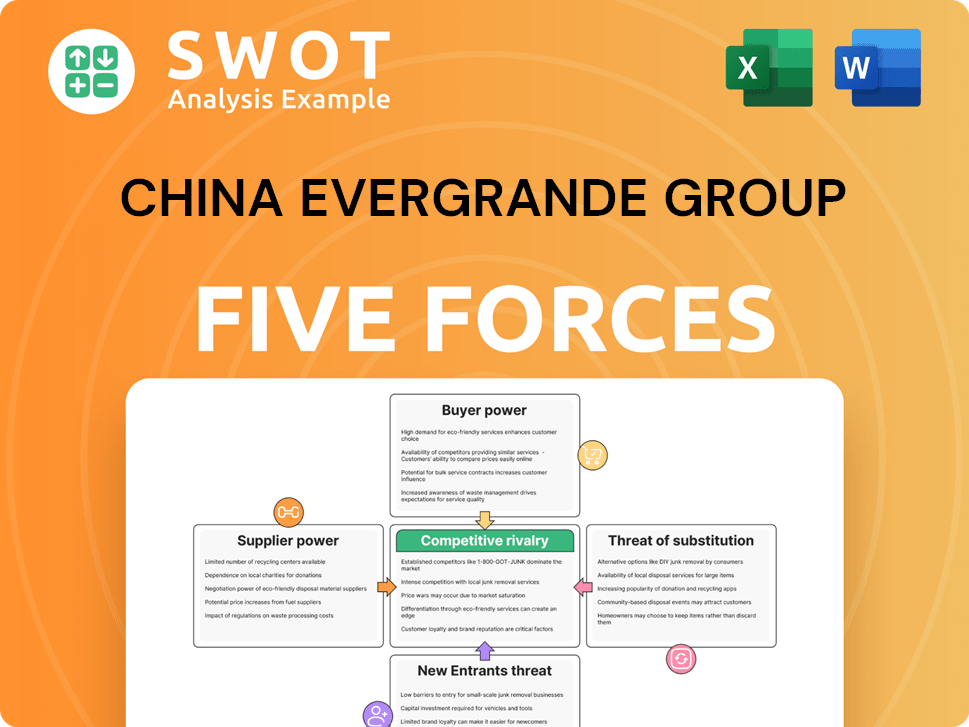
Related Blogs
- What are Mission Vision & Core Values of China Evergrande Group Company?
- What is Competitive Landscape of China Evergrande Group Company?
- What is Growth Strategy and Future Prospects of China Evergrande Group Company?
- How Does China Evergrande Group Company Work?
- What is Sales and Marketing Strategy of China Evergrande Group Company?
- Who Owns China Evergrande Group Company?
- What is Customer Demographics and Target Market of China Evergrande Group Company?
Disclaimer
All information, articles, and product details provided on this website are for general informational and educational purposes only. We do not claim any ownership over, nor do we intend to infringe upon, any trademarks, copyrights, logos, brand names, or other intellectual property mentioned or depicted on this site. Such intellectual property remains the property of its respective owners, and any references here are made solely for identification or informational purposes, without implying any affiliation, endorsement, or partnership.
We make no representations or warranties, express or implied, regarding the accuracy, completeness, or suitability of any content or products presented. Nothing on this website should be construed as legal, tax, investment, financial, medical, or other professional advice. In addition, no part of this site—including articles or product references—constitutes a solicitation, recommendation, endorsement, advertisement, or offer to buy or sell any securities, franchises, or other financial instruments, particularly in jurisdictions where such activity would be unlawful.
All content is of a general nature and may not address the specific circumstances of any individual or entity. It is not a substitute for professional advice or services. Any actions you take based on the information provided here are strictly at your own risk. You accept full responsibility for any decisions or outcomes arising from your use of this website and agree to release us from any liability in connection with your use of, or reliance upon, the content or products found herein.